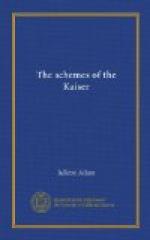September 8, 1897. [15]
The mind of Germany is everlastingly concerned with the toasts proposed by William II. We know the toast proposed after his review of the 8th Army Corps. First of all, come his remarks on the subject of foreign policy. “It rests with us to maintain in its integrity the work accomplished by the great Emperor and to defend it against the influences and claims of foreigners.” On such an occasion, after the remarks on “justice and equity,” which he made on board the Pothuau, the hot-headed Emperor was bound to deliver himself in some such strain.
The next toast was that which he proposed at Hamburg in honour of King Humbert and Queen Marguerita. This one is emphatic and at the same time gracious, for William II cultivates every style and all the arts. On this occasion the King of Prussia, Emperor of Germany, referred as usual to the solidity of the Triple Alliance and to the mandate which it has assumed for the preservation of peace. He spoke as the grandson of William I. King Humbert replied as the grandson of Victor Emmanuel (sic), skilfully gliding over the question of the indissoluble nature of the Triple Alliance and reminding his hearers that Germany has no monopoly in the pursuit of peace, but that all the Governments of Europe are equally concerned in endeavouring to attain it.
A movement is taking shape in Italy, full of danger and of promise, as events will prove. The clericals and the republicans have sketched the outline of an understanding, which looks as if it might be approved by Leo XIII. The danger of this union between the parties will lead King Humbert back to a more national, a more peninsular, policy. The strong opposition that it has to face is useful, in that it will oblige the country’s rulers to pay more attention to home affairs and to the nation’s interests than to the glorification of the dynasty.
September 28, 1897. [16]
“Germany is the enemy,” Skobeleff used to say at Paris in 1882, speaking to the younger generation of Slavs in the Balkans. These prophetic words were inspired in the hero of Plevna by Germany’s intrigues at the Berlin Congress, intricate intrigues, full of menace for the future of the East. They should have haunted the spirit of every chancellery ever since, and become the formula around and about which European diplomacy should have organised its forces to resist Prussia’s invading tendencies.
Until 1870 the liberal, philosophic, learned and federalist genius of Germany, was spreading all over the world through its literature, science, poetry and music, a genius whose attitude and equilibrium were the fruit of an equal fusion of the mind of North Germany with that of the South. By the victories and conquest of 1870, this genius became suddenly and entirely absorbed in Prussian militarism, and has now grown to be a force hostile to all other races. The power of the intellect in all its forms, recognises




